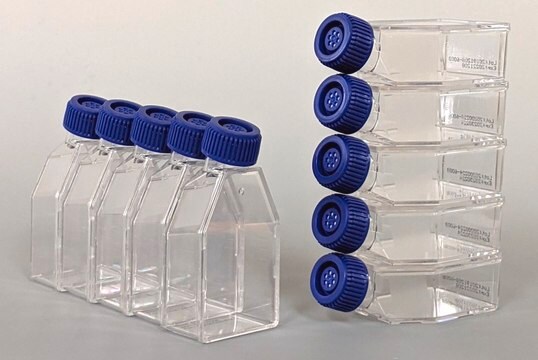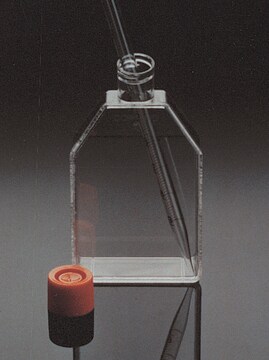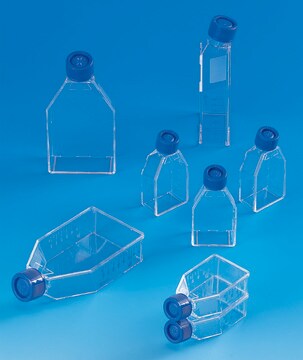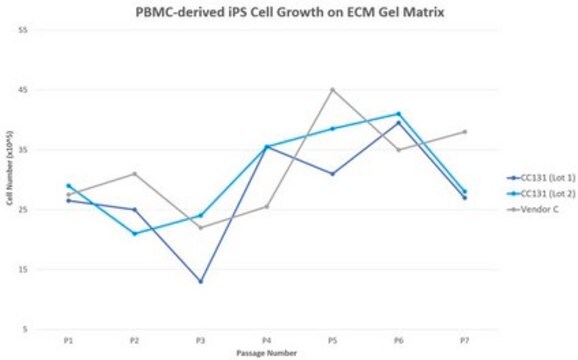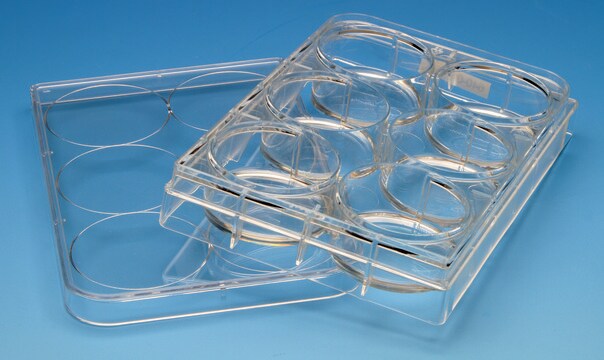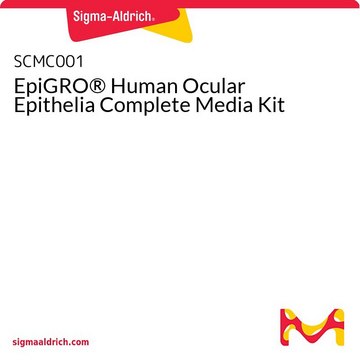CC335
CytoSoft®T-25 Flasks
Elastic Moduli 32 kPa
Sinonimo/i:
T25 cell culture flask
Autenticatiper visualizzare i prezzi riservati alla tua organizzazione & contrattuali
About This Item
Codice UNSPSC:
41106514
NACRES:
NB.13
Prodotti consigliati
Livello qualitativo
Confezionamento
flask of 10 ea
tecniche
cell culture | mammalian: suitable
Temperatura di conservazione
room temp
Cerchi prodotti simili? Visita Guida al confronto tra prodotti
Categorie correlate
Descrizione generale
Instructions For Use
Coating Procedure
Note:Use these recommendations as guidelines to determine the optimal coating conditions for your culture system. The bottom of the plate can be detached by excessive mechanical force such as centrifugation or direct contact with liquid handling tools (tips, pipettes, etc.).
1. Remove the CytoSoft® product from the protective sleeve in a sterile hood.
2. Prepare extracellular matrix material by neutralizing in amine-free buffer pH 7.4 to 7.9 (such as 1X DPBS). We do not recommend using gelatin as your ECM protein. Note: Pre-warm the coating solution to approximately room temperature before use.
3. Dilute as needed, and dispense 1 mL of solution into each well to coat the surface. Note: Recommended dilution for PureCol™ Type I collagen is 1:30 (~100 µg/ml). Note: The hydrophobic surface requires larger volumes to cover the surface than do conventional plastic dishes
4. Incubate ECM coated CytoSoft® at room temperature, covered for 1 hour.
5. After incubation, aspirate any remaining material and rinse coated surfaces immediately two times with culture medium or PBS. Leave about 2.5 mL of medium per well to keep surface covered. Note: Do not allow the CytoSoft® surface to become dry once the surface has been wetted.
6. Coated surfaces are ready for use. Standard harvesting procedures used for removing cells from cultureware can be employed for harvesting cells from the CytoSoft® product including use of trypsin, Accutase® and non-enzymatic cell detachment solutions.
Coating Procedure
Note:Use these recommendations as guidelines to determine the optimal coating conditions for your culture system. The bottom of the plate can be detached by excessive mechanical force such as centrifugation or direct contact with liquid handling tools (tips, pipettes, etc.).
1. Remove the CytoSoft® product from the protective sleeve in a sterile hood.
2. Prepare extracellular matrix material by neutralizing in amine-free buffer pH 7.4 to 7.9 (such as 1X DPBS). We do not recommend using gelatin as your ECM protein. Note: Pre-warm the coating solution to approximately room temperature before use.
3. Dilute as needed, and dispense 1 mL of solution into each well to coat the surface. Note: Recommended dilution for PureCol™ Type I collagen is 1:30 (~100 µg/ml). Note: The hydrophobic surface requires larger volumes to cover the surface than do conventional plastic dishes
4. Incubate ECM coated CytoSoft® at room temperature, covered for 1 hour.
5. After incubation, aspirate any remaining material and rinse coated surfaces immediately two times with culture medium or PBS. Leave about 2.5 mL of medium per well to keep surface covered. Note: Do not allow the CytoSoft® surface to become dry once the surface has been wetted.
6. Coated surfaces are ready for use. Standard harvesting procedures used for removing cells from cultureware can be employed for harvesting cells from the CytoSoft® product including use of trypsin, Accutase® and non-enzymatic cell detachment solutions.
CytoSoft® T-25 flasks have a defined elastic modulus in the bottom of a standard T-25 flask for cell expansion applications. The thickness of the silicone gel is uniform with a ~0.5 mm thick layer of silicone in each flask that is fully compatible with mammalian cell cultures. The silicone gels are activated and ready to bind to a purified ECM, such as PureCol™ type I collagen (#5005) prior to cell addition. The plates are packaged sterilized, and provided with 10 flasks per package.
The rigidity of the substrate to which cells adhere can have a profound effect on cell morphology and gene expression. CytoSoft® products provide a tool to culture cells on substrates with various rigidities covering a broad physiological range. On the bottom of each flask, there is a thin layer of specially formulated biocompatible silicone, whose elastic modulus (rigidity) is carefully measured and certified. The surfaces of the gels in CytoSoft® products are functionalized to form covalent bonds with amines on proteins. This chemical functionalization is stable and the reaction does not require a catalyst, facilitating the coating of the gel surfaces with matrix proteins and plating cells.
The silicone substrates of CytoSoft® products are optically clear and have a low auto-florescence. The layer of silicone in each flask is firmly bonded to the bottom of the flask. Unlike hydrogels (such as polyacrylamide gels), silicone gels are not susceptible to hydrolysis, do not dry nor swell, are resilient and resistant to tearing or cracking, and their elastic moduli (rigidities) remain nearly unchanged during extended storage periods.
CytoSoft® products accommodate the harvesting of cells using enzymes such as trypsin and collagenase. There is no biochemical breakdown of the substrate during or after enzyme treatment, and there are no residuals of the substrate in the sample retrieved from a CytoSoft® plate.
The rigidity of the substrate to which cells adhere can have a profound effect on cell morphology and gene expression. CytoSoft® products provide a tool to culture cells on substrates with various rigidities covering a broad physiological range. On the bottom of each flask, there is a thin layer of specially formulated biocompatible silicone, whose elastic modulus (rigidity) is carefully measured and certified. The surfaces of the gels in CytoSoft® products are functionalized to form covalent bonds with amines on proteins. This chemical functionalization is stable and the reaction does not require a catalyst, facilitating the coating of the gel surfaces with matrix proteins and plating cells.
The silicone substrates of CytoSoft® products are optically clear and have a low auto-florescence. The layer of silicone in each flask is firmly bonded to the bottom of the flask. Unlike hydrogels (such as polyacrylamide gels), silicone gels are not susceptible to hydrolysis, do not dry nor swell, are resilient and resistant to tearing or cracking, and their elastic moduli (rigidities) remain nearly unchanged during extended storage periods.
CytoSoft® products accommodate the harvesting of cells using enzymes such as trypsin and collagenase. There is no biochemical breakdown of the substrate during or after enzyme treatment, and there are no residuals of the substrate in the sample retrieved from a CytoSoft® plate.
Applicazioni
Young′s elastic modulus: 26.0-38.0 kPa
Sterility: Ozone
Cell attachment: Tested
Cell growth: Tested
Sterility: Ozone
Cell attachment: Tested
Cell growth: Tested
Stoccaggio e stabilità
Store CytoSoft® Imaging plates at room temperature.
Altre note
Elastic Moduli 32 kPa
Note legali
Accutase is a registered trademark of Innovative Cell Technologies, Inc.
CytoSoft is a registered trademark of Advanced BioMatrix, Inc.
PureCol is a trademark of Advanced BioMatrix, Inc.
Esclusione di responsabilità
Unless otherwise stated in our catalog or other company documentation accompanying the product(s), our products are intended for research use only and are not to be used for any other purpose, which includes but is not limited to, unauthorized commercial uses, in vitro diagnostic uses, ex vivo or in vivo therapeutic uses or any type of consumption or application to humans or animals.
Codice della classe di stoccaggio
13 - Non Combustible Solids
Classe di pericolosità dell'acqua (WGK)
WGK 3
Punto d’infiammabilità (°F)
Not applicable
Punto d’infiammabilità (°C)
Not applicable
Certificati d'analisi (COA)
Cerca il Certificati d'analisi (COA) digitando il numero di lotto/batch corrispondente. I numeri di lotto o di batch sono stampati sull'etichetta dei prodotti dopo la parola ‘Lotto’ o ‘Batch’.
Possiedi già questo prodotto?
I documenti relativi ai prodotti acquistati recentemente sono disponibili nell’Archivio dei documenti.
Il team dei nostri ricercatori vanta grande esperienza in tutte le aree della ricerca quali Life Science, scienza dei materiali, sintesi chimica, cromatografia, discipline analitiche, ecc..
Contatta l'Assistenza Tecnica.